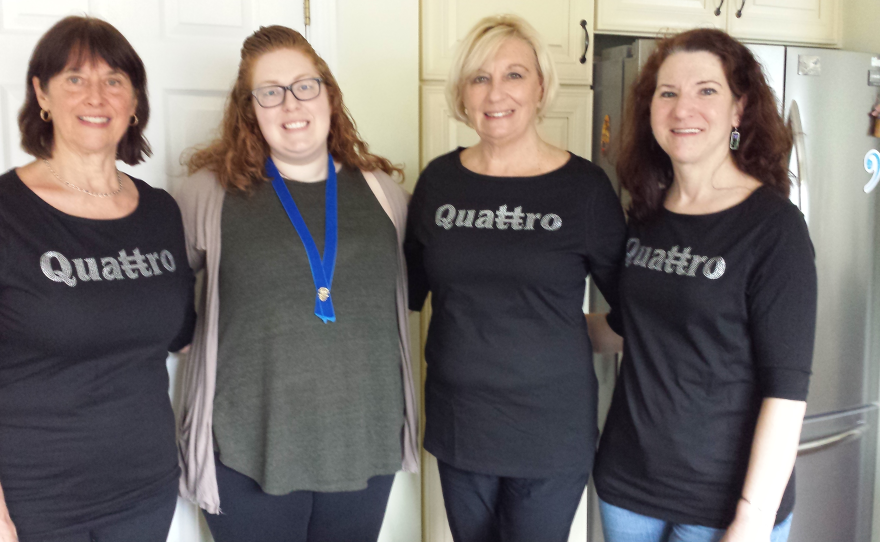On Friday, women Barbershop singers from all over New England and some parts of Canada will descend on Springfield. They're competing for a spot in the international competition taking place in Las Vegas this fall.
The four women who make up the VOCE barbershop quartet meet weekly in Agawam, Massachusetts. That means driving about two hours for two of them -- Deanna Sargent of Ballston Spa, New York, and Judy Sheriff, of Westford, Massachusetts. Luckier Angie Clark and Beth Paul are both Agawam residents.
All of them are card-carrying members of Sweet Adelines International, an organization 25,000-women strong, dedicated to promoting the uniquely American art form known as barbershop harmony. VOCE is a two-time winner of the North Atlantic regionals.
Until the mid-1940s, Barbershop was officially the province of men. The genre evolved as they met on street corners and harmonized by ear -- also known as "woodshedding" -- to the melodies of popular songs.
Remember "Lida Rose," from The Music Man?
A men's organization for the preservation and and encouragement of Barbershop formed. But some of the wives wanted in, and in 1945, Sweet Adelines was born.
Most members of Sweet Adelines -- who sing in quartets or choruses or, often, both -- perform. Sometimes for free, sometimes not. And they compete against each other.
"But you know what -- with all the seriousness and all the work, it's incredibly, incredibly fun," said Patti Lavernoich of Beacon Falls, Connecticut, who is an events coordinator with Sweet Adelines.
She says even the judges at the competition train for years, and are themselves tested: On their abilities to discern excellence -- not only in the singing, but in expression, synchronization and showmanship.
Of the panel of four judges, only one is permitted to watch what's happening on stage. The other three keep their heads down; all they do is listen.
They hear every little problem a singer has, Lavenoich added, laughing.
So the pressure's on for the 24 quartets and 18 choruses about to compete in Springfield. And they have money on the line, too. In addition to ponying up for organization dues and other fees, not to mention the glitzy costumes, transportation and hotel charges -- many also hire coaches.
Angie Clark, who's part of the Agawam quartet, coaches other singers, too. At a rehearsal for Qua#ro, a quartet that meets in Middletown, Connecticut, she's also singing the bass part for someone unable to make it.
"Now, start at the beginning, with that kind of connected sound, and that kind of expression," Clark told them.
Candace Nielson, Pia Kroes and Mary Blewitt, whose kitchen is doubling as the rehearsal space, are all listening intently.
This competition in Springfield will be Qua#ro's first. Asked what she thought the groups chances are, Blewitt replied, "We're brand new."
"We're just hoping we won't be last, " Neilson said, laughing along with the others.
And VOCE? Where are they hoping to place?
First. In the world. Though, maybe not this year.
And what do their coaches -- they've got 4 or 5 -- say they need to do to get there? They've nailed the technical challenges. What's left to do now is sing with abandon.
"You know, to really tell the story through all of it, through the musical instrument, but also through our body language, but really to feel each passage and each word," said Sargent.
And as every singer knows, you have to really feel it to sell the song.
The competition continues through Saturday at Springfield's Symphony Hall.



